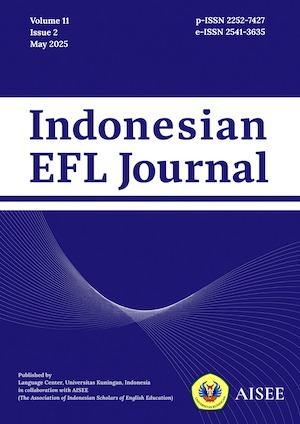LANGUAGE LEARNING STRATEGY AND STUDENTS’ WRITING SKILL ACHIEVEMENT: A CORRELATIONAL RESEARCH
Abstract
Since writing is fundamental in learning to think and express one’s thoughts in ways that reach others, the ability to use language coherently and powerfully and to wrtite in ways that connect with others across cultural boundaries and within communities is essential to active citizenship and to success in almost any profession. The problem of the study was to know whether or not there was a significant correlation between students’ learning strategy and their writing skill achievement of the second semester students at IKIP PGRI Bojonegoro. This research was a correlational research. The instruments used in this research were writing test and learning strategy questionnnaire. Then, the correlation of the data was calculated by using Pearson Product Moment Formula. The result showed that there is a correlation between students’ learning strategy and their writing skill achievement of the second semester students at English Education Department of IKIP PGRI Bojonegoro in academic year 2016/2017.
Keywords: Learning strategy; writing skill; achievement; correlational research.
References
Allwright, D. (1990). Autonomy in language pedagogy: CRILE working paper 6. Centre for research in education. UK: University of Lancaster.
Brown, H. D. (2000). Principles of language learning and teaching. New York: Longman Inc.
Cohen, A. D. (2007). Coming to terms with language learner strategies: Surveying the experts. In D. C. Cohen, & E. M. Macaro, (Eds.), Language learner strategies. UK: Oxford University Press.
Daud, N. S., & Kasim, N. L. A. (2007). Second language writing anxiety. Malaysian Journal of ELT Research, 1-9.
Deneme, S. (2008). Language learning strategy preferences of Turkish students. The Journal of Language and Linguistic Studies, 4(2), 83-93.
Dreyer, C., & Oxford, R. (1996). Learning strategies and other predictors of ESL proficiency among Afrikans-speakers in South Africa. In R. Oxford (Eds.), language learning strategies around the world: cross-cultural perspectives (pp. 61-74). Manoa: University of Hawaii Press.
Ellis, R. (2003). Second language acquisition. Oxford: Oxford University Press.
Foong, K. P. (1999). Teaching writing: A look at purposes, writing tasks, and implication. The English Teacher, 28, 2-5.
Fuping, X. (2006). The impact of strategy training on reading comprehension. CELEA Journal, 29(4), 36-42.
Green, J. M., & Oxford, R. L. (1995). A closer look at learning strategies, L2 proficiency, and gender. TESOL Quarterly, 29(2), 261-297.
Griffiths, C. (2003). Patterns of langugae learning strategy use. System, 31, 367-383.
Harmer, J. (2004). How to teach writing. London: Pearson Education Limited.
Harmer, J. (2007). The practice of English language teaching (4th ed.). United States of America: Longman.
Hong, K. (2006). Beliefs about language learning and language learning strategy use in an EFL: A comparison study of monolingual Korean and bilingual Korean-Chinese university students. Unpublished Doctoral Dissertation, University of North Texas.
Kellog, R., & Whiteford, A. (2009). Training advanced writing skills: The case for deliberate practice. Educational Psychologist, 44, 250-266.
Lee, K. (2003). The relationship of school year, sex, and proficiency on the use of learning strategies in learning English. Asian EFL Journal, 5(4), 1-36.
Little, D. (1991). Learner autonomy 1: Definitions, issues, and problems. Dublin: Authentik National Assessment of Educational Progress.
O’Malley, J. M., Chamot, A. U., Stewner-Manzanares, G., Kupper, L. J., & Russo, R. P. (1985). Learning strategies used by beginning and intermediate ESL students. Language Learning, 35(1), 21-46.
O’Malley, J. M., & Chamot, A. U. (1990). Learning strategies and second language acquisition. New York: Cambridge University Press.
Oxford, R. L. (1990). Language learning strategies: What every teacher should know. New York: Newbury House/ Harper & Row.
Oxford, R. L. (1993). Research on second language learning strategies. Annual Review of Applied Linguistics, 13, 175-187.
Oxford, R. L. (2003). Language learning styles and strategies: An overview. Oxford: GALA.
Park, G. (1997). Language learning strategies and English proficiency in Korean university stuets. Foreign Language Annals, 30(2), 211-221.
Phillips, V. (1991). A look at learner strategy use and ESL proficiency. CATESOL Journal, 57-67.
Powell, P. (2009). Retention and writing instruction: Implication for access and pedagogy. College Composition and Communication, 60, 664-682.
Rahimi, M., Riazi, A., & Saif, S. (2008). An investigation into the factors affecting the use of language learning strategies by persian EFL learners. CJAL, 11(2), 31-60.
Raimes, A. (1983). Techniques in teaching writing. New York: Oxford University Press.
Ratnasari, D. (2004). Improving students’ writing skills by using peer editing strategy in the writing process at the 4th semester of UMM. Unpublished Thesis. Malang: Postgraduate Program of Islamic University of Malang.
Rubin, J. (1975). What the ‘good language learner’ can teach us. TESOL Quarterly, 9(1), 41-51.
Rubin, J., & Thompson, I. (1994). How to be a more successful language learner (2nd ed.). Boston: Heinle & Heinle.
Stern, H. H. (1975). What can we learn from the good language learner? Canadian Modern Language Review, 31, 304-318.
Weinstein, C. E., & Mayer, R. E. (1990). The teaching learning strategies. New York: Macmillan.
White, C. (2008). Language learning strategies in independent language learning: An overiew. In S. Hud, & T. Lewis (Eds.), Language learning strategies in independent settings (pp. 3-24). Bristol, UK: Multilingual Matters.
Yale, J. B. (2010). The relationship between reading and writing. Retrieved from http://www.k12reader.com/the-relationship-between-reading-and-writing.
Ya-Ling, W. (2008). Language learning strategies used by students at different proficiency levels. The Asian EFL Journal Quarterly, 10(2), 75-95.
Yang, M. N. (2007). Language learning strategies for junior college students n taiwan: investigating ethnicity and proficiency. The Asian EFL Journal, 9(2), 35-57.
Zare, P. (2012). Language learning strategies among EFL/ESL learners: A review of literature. International Journal of Humanities and Social Science, 2(5), 162-169.









